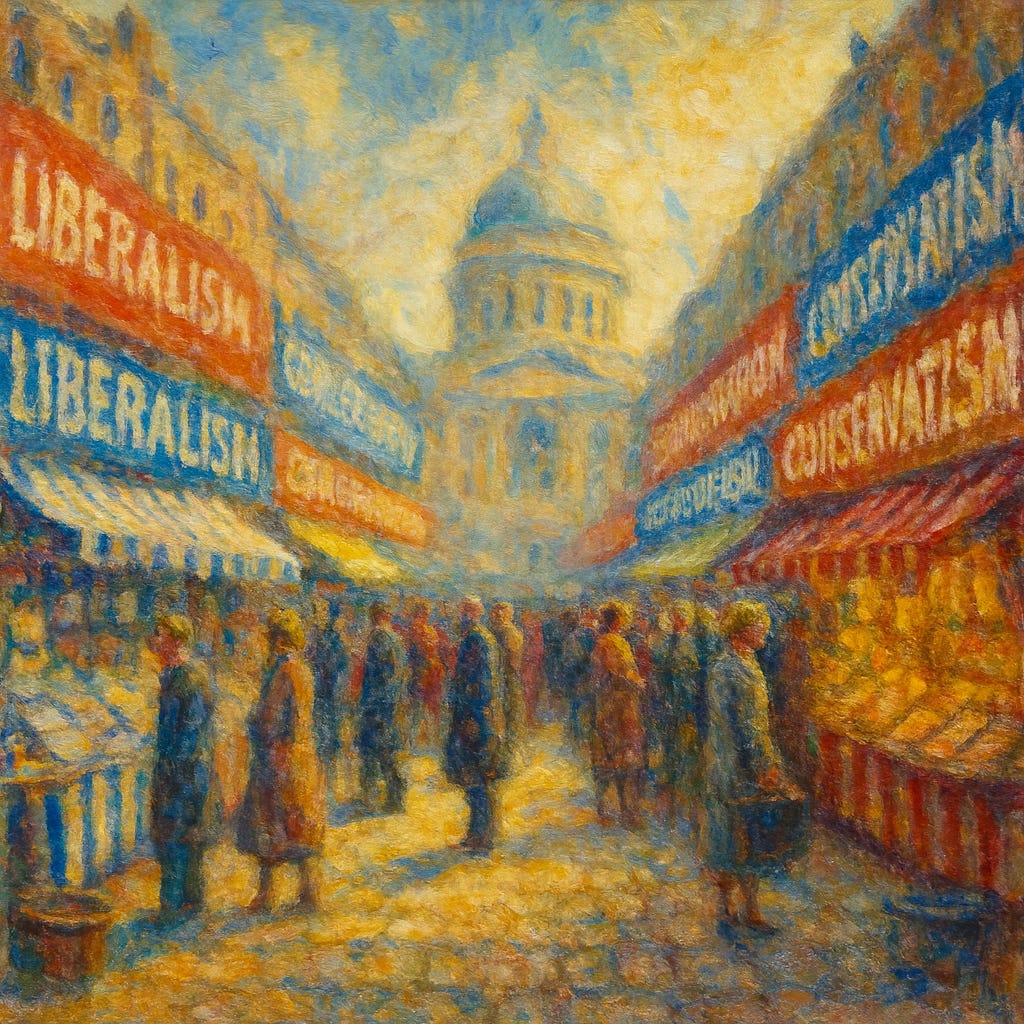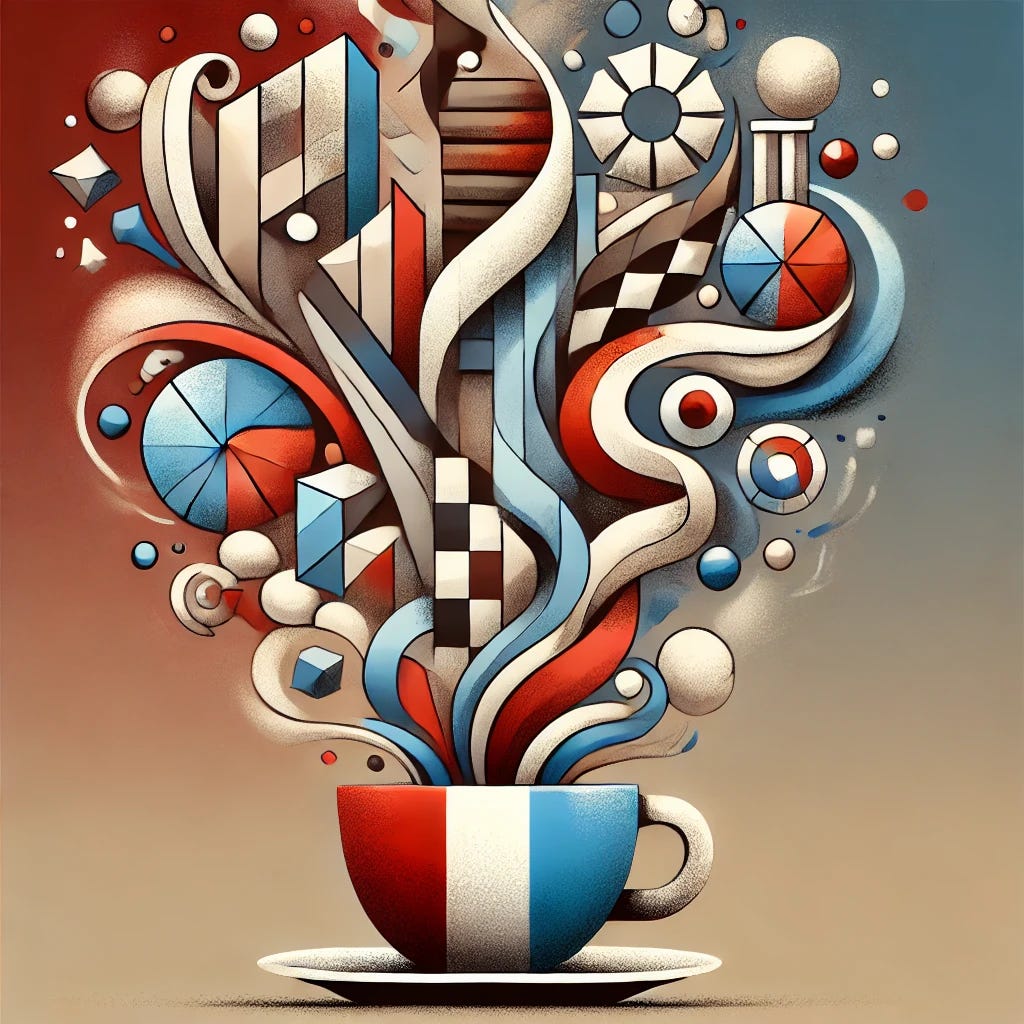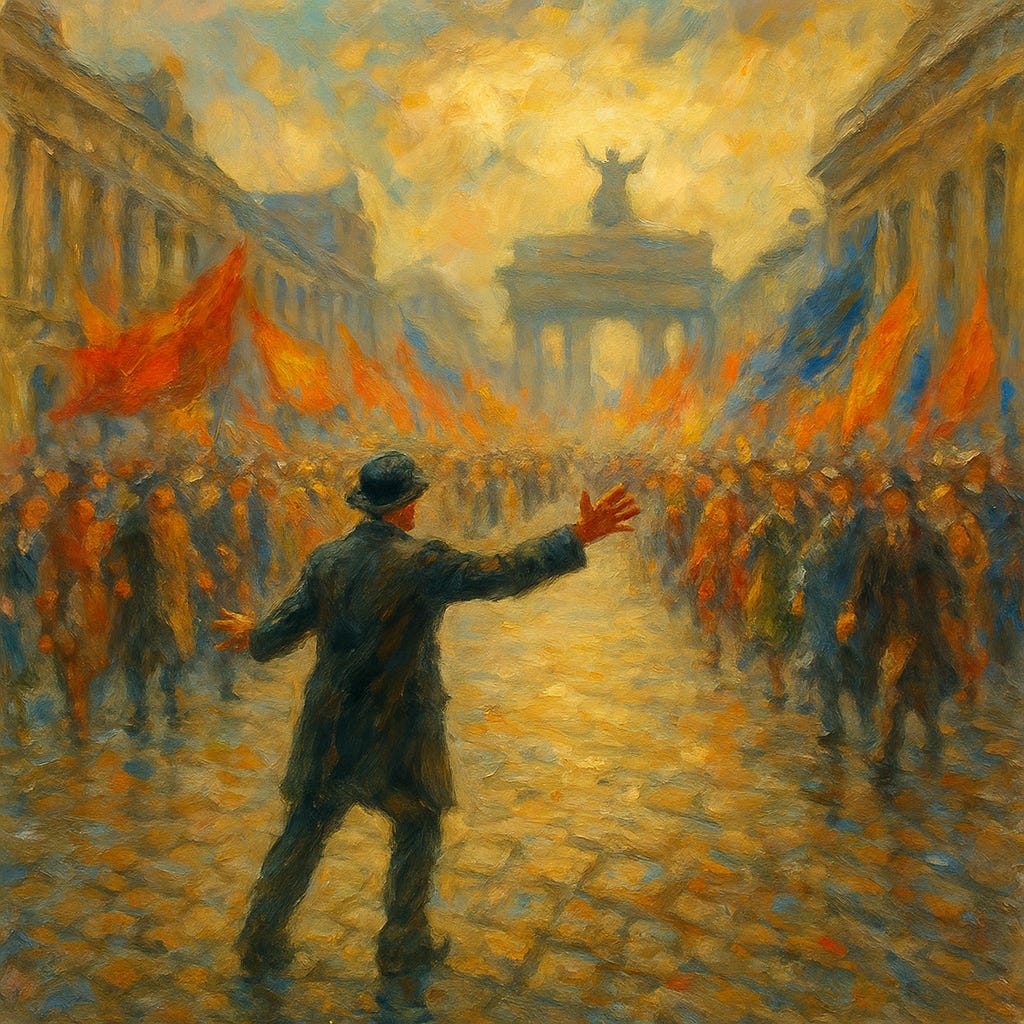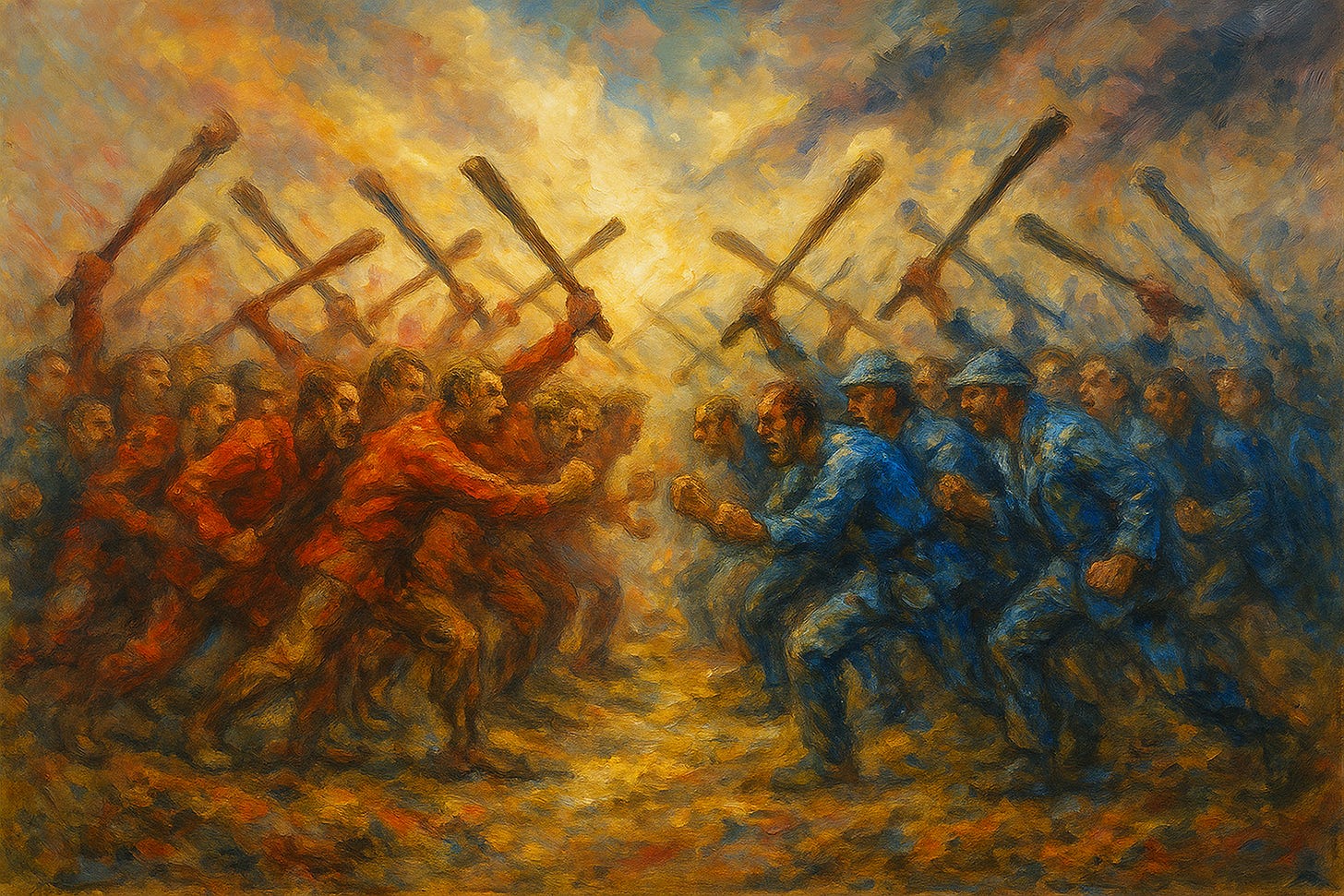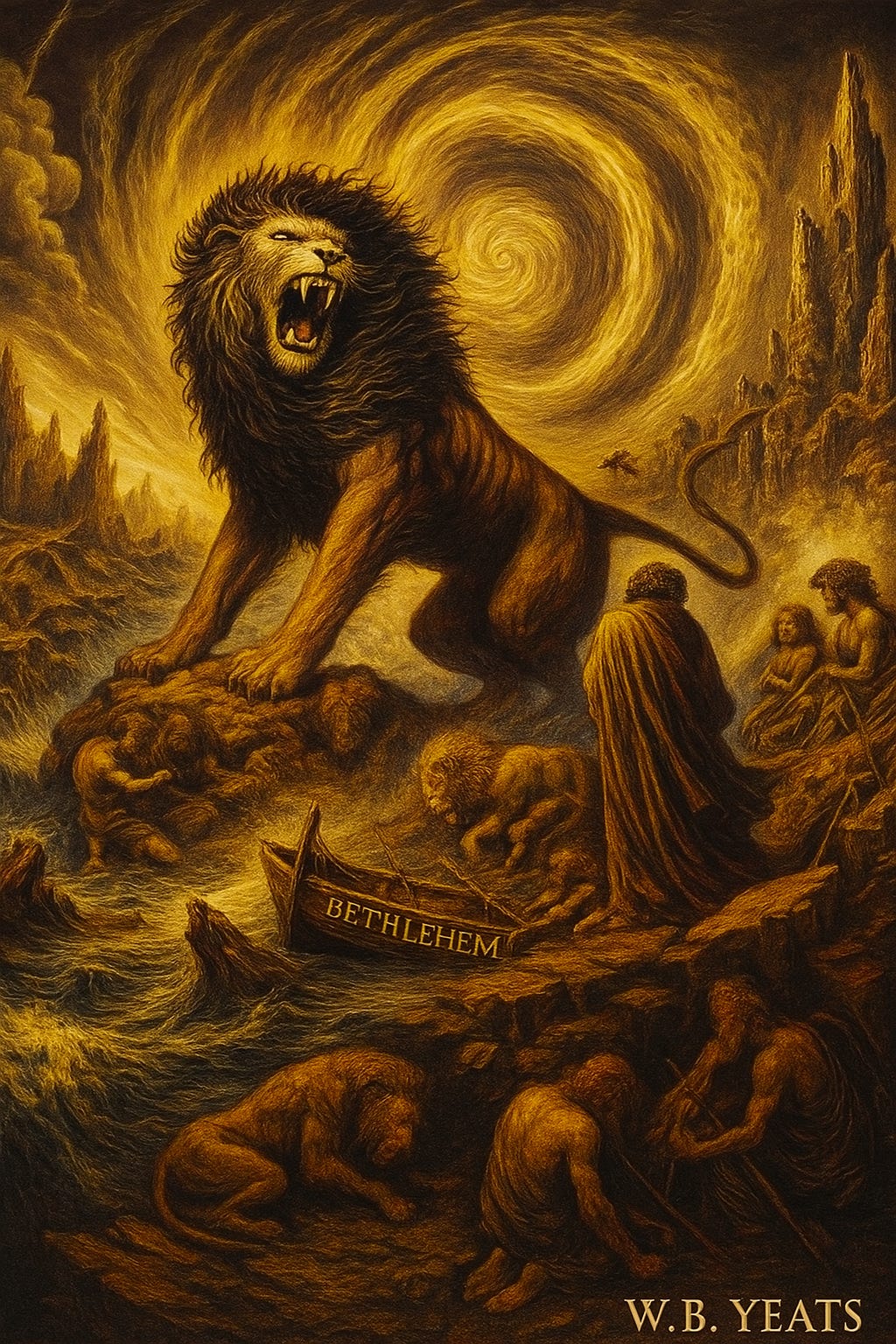The Politics of Champagne and Vegetables
Why Progressivism Flatters and Conservatism Merely Works
If you believe in the importance of free speech, subscribe to support uncensored, fearless writing—the more people who pay, the more time I can devote to this. Free speech matters. I am a university professor suspended who was fired because I called Hamas Nazis.
\We like to flatter ourselves that we are creatures of reason, and that our politics is a neat alignment of principle and policy, of ethical conviction and practical program. But life, alas, refuses to be so tidy. Research shows that political leanings are stirred from many ingredients — subconscious bias, upbringing, lived experience, and, if you believe the behavioural scientists, a dash of genetic predisposition. Political positions are less a coherent manifesto than a soup of instincts. After enough stirring and simmering, it isn't easy to reverse-engineer the recipe.
And what of the moderates, the self-proclaimed independents, those who sneer at the cart before the horse? They flatter themselves as free of ideological drag, as people whose ethical values lead them where they must. They disdain party politics, recoil from slogans, and claim the high ground of principle over tribalism.
And yet — they, too, are bent by the same unseen magnets of status, belonging, and self-image that tug on the liberals (sorry, progressives) and conservatives (a movement still searching for a label as “cool” as progressive).
Jonathan Haidt, in The Righteous Mind, explains how any ideology, liberalism included, binds its adherents into moral communities. Liberalism packages itself as empathy, fairness, and care, and it rewards its disciples with a pleasing sense of moral elevation. One begins to feel superior simply by holding the correct values. “Morality binds and blinds,” Haidt warns — it welds us into teams and sends us onto the battlefield of politics with the conviction that history itself hinges on our side prevailing.
The conservative predicament is trickier. Liberalism comes with the sex appeal of a luxury brand. Conservatism, meanwhile, has a branding problem.
History books are not filled with tales of people who didn’t storm the barricades. Conservatism’s very name is derived from caution, restraint, the refusal to dance after every passing piper. In a world intoxicated with novelty and disruption, being the custodian of inherited wisdom feels unglamorous, like standing still while everyone else charges forward.
Yuval Levin has argued that conservatism is not nostalgia but humility — the recognition that human beings are flawed and that radical change often produces misery in pursuit of utopia. This is true enough, but it is a hard sell to an electorate that craves “reinvention.” A ballast is necessary, but it is rarely sexy. After all, how many films climax with the captain dropping anchor? The cultural canon prefers to hoist the sails, face the storm, and sing about destiny.
The Canadian Divide
And it’s here where Canada offers a case study in branding asymmetry. Justin Trudeau and Mark Carney have built an entire career on the politics of progressive branding: cross-legged photoshoots, rainbow socks, tearful apologies, and a rhetorical monopoly on “inclusion.” The message isn’t governance; it’s theatre. It flatters Canadians by allowing them to imagine themselves as kind, enlightened, and morally superior.
Prime Minister Carney, the bankers’ banker, has tried the same trick, sprinkling climate homilies and identity pieties into his otherwise bloodless technocracy. Pierre Poilievre, meanwhile, has the opposite task: trying to sell sobriety, fiscal discipline, and restraint to a culture addicted to moral champagne. Poilievre can point at debt and decay until he’s blue in the face, but Trudeau only has to bat his lashes at the cameras and say “sunny ways.”
The polling numbers tell the story. In Nanos’s late-2024 tracking, 50% of women said they would vote Liberal versus 30% Conservative; among men, the polarity flipped — about 50% Conservative, 34% Liberal.
Why? Because liberalism brands itself as empathy, tolerance, and the promise of protection — values more resonant with women in survey after survey. Conservatism, by contrast, is sold as discipline, risk, and hard limits — traits that men identify with more readily. It isn’t chromosomes that divide us but value sets, and one has a shinier ad campaign.
The Branding Wars
Research into political identity shows that liberalism often functions as a kind of social signalling. It is an aspirational brand — akin to driving a Tesla or sipping a soy latte — a way of broadcasting that you are “on the right side of history.” Psychologist David Dunning (of the Dunning–Kruger effect) notes that people derive deep psychological satisfaction from believing themselves smarter or morally superior to others.
Jaime Napier’s studies show that liberals perceive their views as “high-status,” which feeds into their self-worth. To be progressive is to join an aspirational community, like buying into an exclusive club whose membership proves both virtue and sophistication.
And the branding is brilliant. “Progressive” suggests forward momentum, inevitability, and moral heroism. It casts adherents as characters in a grand narrative of human liberation. As long as “progress” is equated with the good, progressives monopolise the moral high ground. Conservatism, meanwhile, is cast as stodgy, resistant, perhaps a little dim. William F. Buckley’s famous line about standing athwart history yelling “Stop” might be necessary at times, but yelling “Stop” rarely gets you invited to the victory parade.
Victor Davis Hanson has described modern liberalism as “moral narcissism” — adopting fashionable causes not for their results but for the warm glow of feeling superior. Thomas Sowell has skewered the same habit, noting that modern education has equipped people less with the capacity to argue and more with the knack of venting emotions and repeating slogans. The point is that progressive politics deliver not only a worldview but a dopamine hit. They flatter, they reward, they market themselves as the champagne of politics.
And conservatives? They offer vegetables. Caution, humility, tradition. Necessary, nourishing, but hardly the stuff of hashtags. The conservative’s appeal is not to status but to restraint: don’t burn down the cathedral to build a mall; don’t shred the constitution because Twitter says so; don’t sneer at your ancestors unless you are prepared to be sneered at by your descendants. True, these lessons matter enormously. But they are harder to Instagram.
Champagne vs. Vegetables
And so the romance belongs to progress. Liberalism promises not only policy but personal transformation: you are a visionary, enlightened, morally ahead of your time. Conservatism promises you an anchor and a map. Necessary, but not glamorous.
Consider branding in the commercial marketplace. Liberalism is Apple: sleek, seductive, promising to “think different.” It prioritises lifestyle over substance, with devotees queuing in the rain for each new iteration, despite the iPhone 16 and iPhone 17 offering little more than thinner bezels, better battery and a new shade of beige.
Conservatism, meanwhile, is IBM: clunky, unglamorous, but the entire banking system still runs on its servers. One sells you glamour, the other holds up civilisation. Guess which one gets the standing ovations.
Or take cars. Progressivism is Tesla: virtue-signalling on wheels, complete with smug autopilot and an aura of inevitability — “the future.” Conservatism is Volvo: boxy, steady, safe, boring, but the thing will actually protect your children in a crash. Which matters more — impression or impact?
Branding studies tell us people buy what flatters them, not what works. Politics is no different. Liberals sell a sense of being enlightened, ahead of history, chicly compassionate. Conservatives sell caution, responsibility, and the awkward reminder that human beings are flawed and the world does not reboot with every hashtag. In other words, liberals market champagne, conservatives market vegetables. Guess which one goes viral on Instagram.
But civilisation, like the human body, can only survive on champagne for so long before it keels over. The ballast, the broccoli, the boring server humming in the background — these are what prevent collapse. Liberalism may win the advertising awards, but conservatism keeps the lights on.
If you value this work, consider leaving a tip. It’s cheaper than therapy, less pious than public broadcasting, and the only censorship here is my bad taste. On second thought, it’s bad therapy.
“Morality binds and blinds. It binds us into ideological teams that fight each other as though the world's fate depended on our side winning each battle.”
— Jonathan Haidt.



